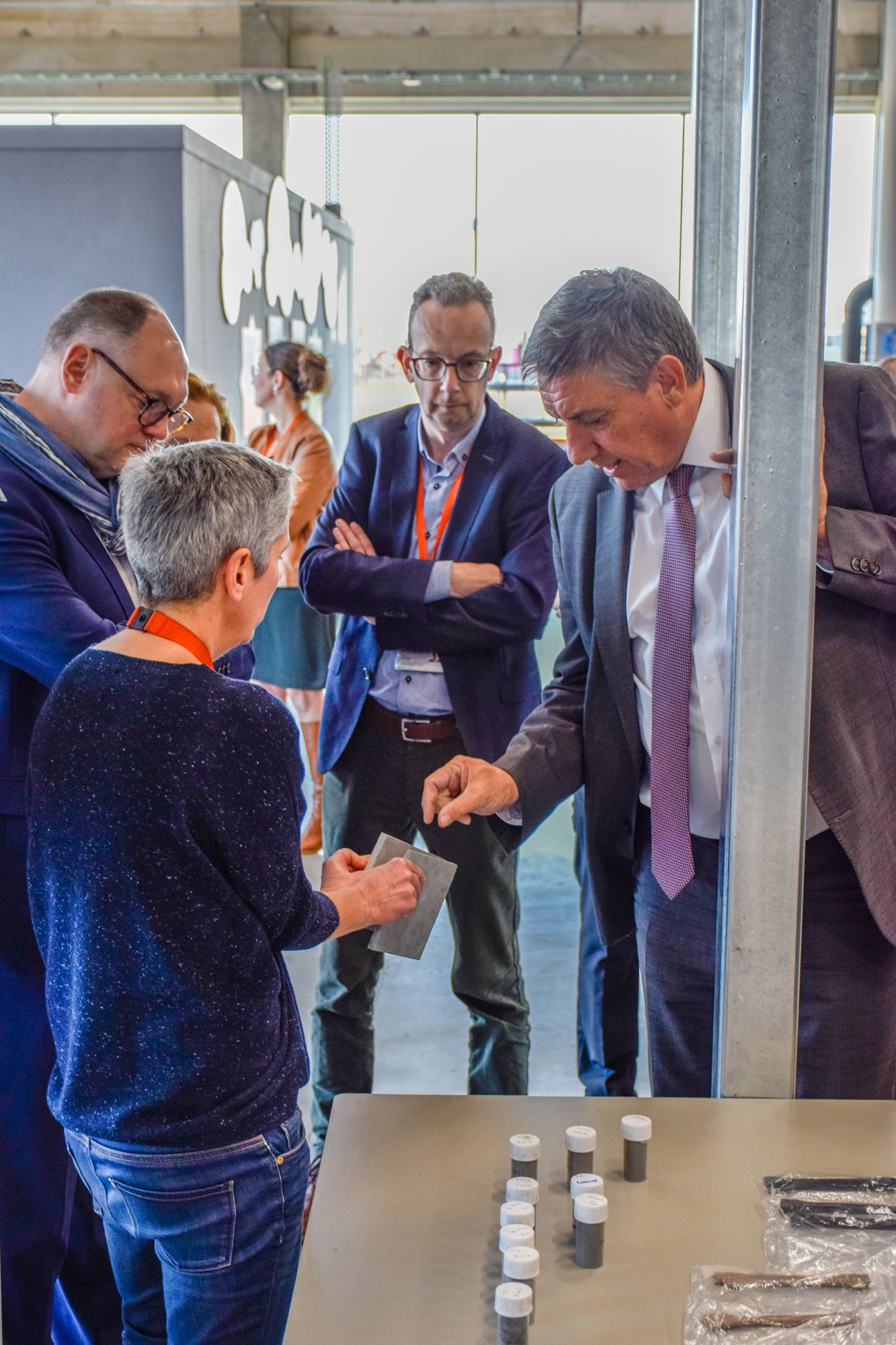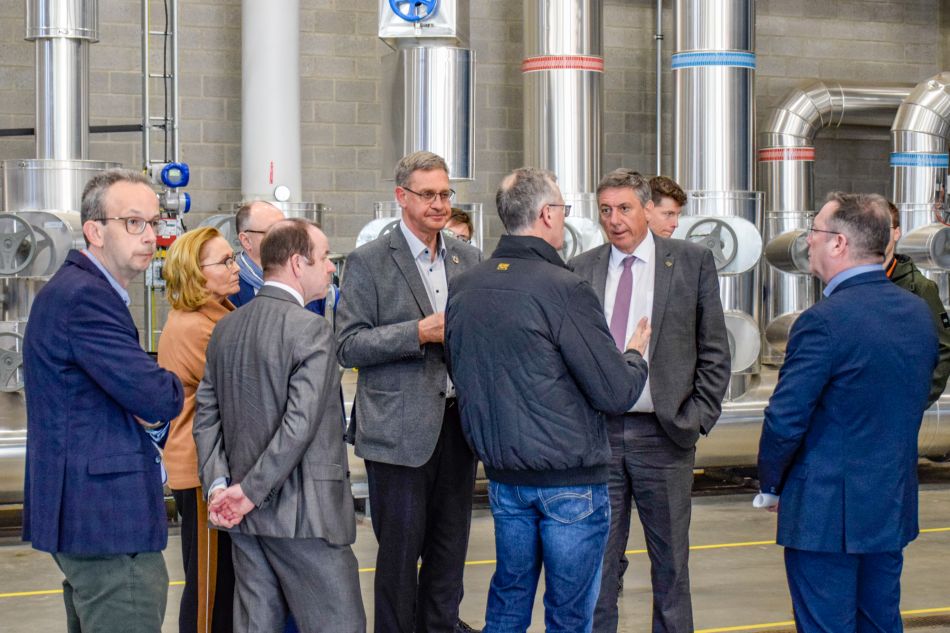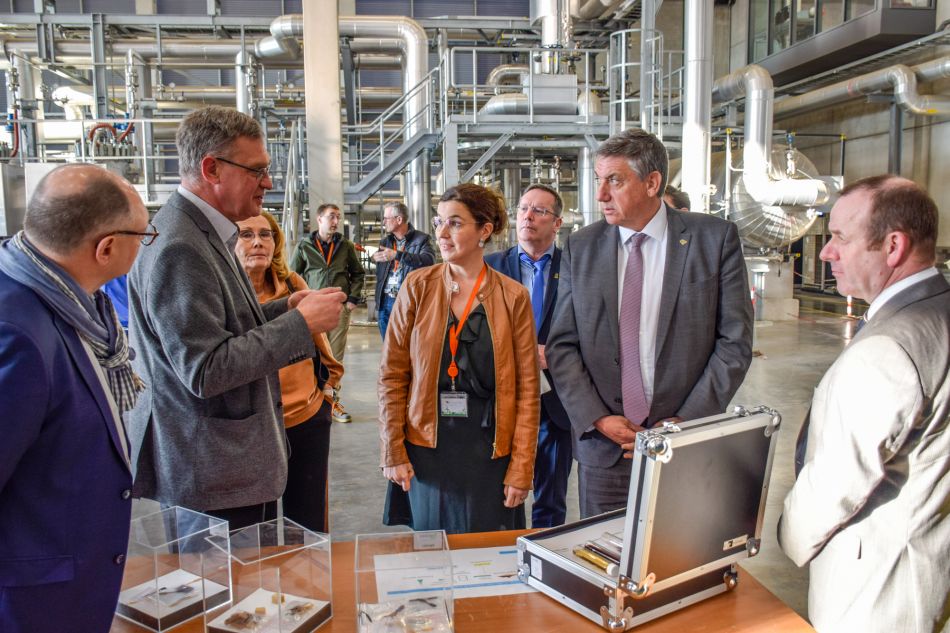Mol, 10 March 2022: Today Minister-President of Flanders Jan Jambon and Claire Tillekaerts, Managing Director of FIT, paid a working visit to Flemish research organisation VITO. Special attention was paid to the international context.
VITO is active on all continents with urban climate resilience studies, national development programmes on CO2 & greenhouse gas emission reduction and agriculture & forestry. With G-STIC, VITO plays an active role in project acquisition in the framework of international climate financing with resources from the Flemish climate fund.
During a guided tour, the guests were presented with a number of projects that have outgrown the test tube: LignoValue Pilot, Flame and geothermal or deep geothermal energy. The Prime Minister was very interested and impressed by the achievements of VITO. It will certainly be continued.
Climate services on a global scale
Besides Flanders and Europe, VITO is also very much focused on the international context. In China, India and the Middle East, for example, VITO works with industrial parties on the roll-out of technology. In addition, VITO also works with funding from the World Bank in countries such as Colombia, India, South Africa & West Africa. Finally, VITO also cooperates with a number of other countries through bilateral funding, both from Flanders as well as from the federal and European level.
In recent years, more international successes have been achieved thanks to collaborations with Flanders. Examples of Flemish partnerships include the battery test bed in South Africa and the G-STIC climate action programme. In Uganda, Malawi, Mozambique & Morocco, we initiated the NDC Support Centre together with the African Union. This enables us to establish good relations with the local governments, which in turn could initiate a possible expansion to (Flemish) industry.
Flemish funding as a lever for impact of Flemish companies in developing countries
During the Flemish Week in Dubai, we were able to invite His Excellency President Chakwera of Malawi to the G-STIC conference as part of that NDC Support Centre. In Morocco, the new Minister of Energy Leila Benali attended the kick-off meeting and our contacts could intensify Flemish cooperation.
The cooperation with Flanders has a double result. On the one hand, as a knowledge centre from a modest region, VITO occupies a much stronger position on the international stage, which is mostly dominated by the French, Germans and Scandinavians. On the other hand, VITO is the first to observe that Flemish funding acts as a lever for the growing impact of Flemish companies and knowledge centres in developing countries. VITO is committed to continue playing this partner role - also in new countries of development cooperation.
Climate fund
In 2016, VITO launched G-STIC, the Global Sustainable Technology & Innovation Community, with an annual international conference as an important milestone. G-STIC is currently one of the largest international conferences on how technological innovation can contribute to achieving the SDGs or Sustainable Development Goals. It actively promotes the quadruple helix model, i.e. cooperation between governments, industry, the scientific community and civil society.
In 2021, G-STIC's network and know-how were used to organise a first call for projects in the framework of international climate financing referred to in the communication to the Flemish Government (VR 2020 1812 MED.0431/1BIS).
The subsidy programme, with resources from the Flemish climate fund, focuses on the implementation and scaling up of climate plans and solutions in developing countries and is in linec with the objectives of international climate financing.
G-STIC offers an international platform for dissemination and networking and is also responsible for the organisation of targeted matchmaking events with the aim of bringing potential solution providers into contact with the demand side (National Designated Entities (NDEs), development organisations, policy makers from specific countries, etc.).
The first call for projects in 2021 in the framework of international climate financing provided support of 3,017,724 euros to 10 dissemination and knowledge building projects and 2 demonstration projects, with the involvement of Flemish actors. These projects strengthen the implementation of climate policies, strategies, regulations, action plans and actions of developing countries, both for adaptation and mitigation. In addition, these projects have a major impact on climate-related policy fields, such as energy, water & sanitation, environmental policy, biodiversity, education & research and agriculture.
LignoValue Pilot: bio-aromatics from lignin
Flanders has made a strategic move towards the development of bio-aromatics from lignin (a plant side-product from the wood and paper industry) to contribute to the realisation of a circular bio-based economy. In order to realise an industrially relevant breakthrough in this field, VITO is investing in a pilot installation that can produce more than 100 kg of innovative bio-aromatics a day.
This should allow for the creation of a new value chain of these innovative bio-aromatics with commercial end-users who will market the materials. The new value chains should help reduce the chemical industry's dependence on fossil and secondary raw materials and thus contribute to reducing the effects of climate change (CO2 reduction).
Most of the processes for the production of lignin-based bio-aromatics have already been developed and demonstrated at lab scale. Since 2018, VITO has committed to design and build two pilot plants, namely LignoValue Pilot and PILLAR II, that allow the first production of bioaromatics from lignin. The LignoValue Pilot was delivered on 17 January and is currently in the final phase for commissioning, i.e. functional testing of the unit.
FLAME: FLy Ash to valuable MinErals
In recent years VITO, together with the Flemish SME Value Ash Technology, has scaled up a new separation technology for so-called dry powder from a laboratory scale (10 kg/h), over a pilot scale (100 kg/h) to a demo scale (1000 kg/h). The first step was co-financed by Flanders (MIP project). The second step was realised in cooperation with European knowledge centres and industrial players such as Atlas Copco, with the support of the European EIT Raw Materials.
The 'FLAME' device was developed to separate fly ash into valorisable fractions. Because the ashes, which largely come from coal installations, contain various impurities, they are currently mainly landfilled. FLAME separates the fly ash into very fine particles (1-10 µm), medium (10-30 µm) and coarse particles (>30µm). The method distinguishes itself from current cyclone technology by its lower energy consumption and higher selectivity for the round fly ash particles.
In this project, a fully-fledged valorisation route was developed for each of the fractions. The fine fraction can replace up to 30% of cement in HPC (high performance concrete) applications, the same replacement percentage applies for the medium fraction when used in regular concrete. The coarse fraction can be used as a substitute for sand.
At the same time, VITO is also researching the wider use of the technology for the separation of other ashes (biomass, household waste incineration) and the purification of dust flows from the metal industry.
Deep geothermal energy
A switch to domestic renewable energy sources is necessary in order to save the climate and become less dependent on energy imports. The production of wind and solar energy is weather-dependent. Therefore, there is a need for energy sources that are available day and night. Besides electricity, heat accounts for half of our energy demand. Deep geothermal energy is a continuous, sustainable source of energy that supplies electricity and heat simultaneously. VITO is convinced that deep geothermal energy is an indispensable link in the energy mix of the future.
Exploiting geothermal heat is not an easy task; it requires specific expertise. The construction of the first geothermal power plant in Flanders, on the Balmatt site in Mol, is a technological masterpiece. In addition to heat, VITO also wants to generate green electricity.
VITO has built a geothermal power plant on the Balmatt site, with 3 wells. From 2021, the plant will be an integral part of a test programme to investigate induced seismicity, with a view to completely safe geothermal heat extraction in the future.





